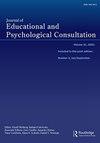An Examination of the Psychometric Properties of the Consultation Self-Efficacy Scale in Taiwan
IF 1.1
4区 心理学
Q4 PSYCHOLOGY, EDUCATIONAL
Journal of Educational and Psychological Consultation
Pub Date : 2020-07-19
DOI:10.1080/10474412.2020.1793348
引用次数: 2
Abstract
ABSTRACT The purpose of this study was to examine an adaptation of the Consultation Self-Efficacy Scale (CSES) and its psychometric properties among Chinese-speaking populations. The participants included 428 undergraduate and graduate-level students from school counseling training programs in Taiwan. We performed exploratory factor analyses to examine the factor structure of the Chinese version of the CSES and identified five relevant factors that were different from the original factor structure: (a) Process and Awareness, (b) Client Skills, (c) Cultural Sensitivity, (d) Intervention, and (e) Facilitation. The results of reliability estimates supported the internal consistency of each factor (ω and α >.91). Collectively, the five factors accounted for 67.59% of the variance among the items, indicating its psychometric adequacy. Possible explanations for the restructuring of the CSES factors with the cross-cultural sample are discussed. The validated Chinese version of the CSES can be utilized as a progress monitoring or outcome measure for pre-service and in-service consultation training purposes in Taiwan. Additional validation research is warranted for generalization of its usage to other Chinese-speaking professions.台湾地区咨询自主权量表心理测量性质的调查
摘要本研究的目的是考察咨询自我效能量表(CSES)在汉语人群中的适应性及其心理测量学特征。参与者包括来自台湾学校辅导培训项目的428名本科生和研究生。我们通过探索性因素分析来检验中文版CSES的因素结构,并确定了与原始因素结构不同的五个相关因素:(a)过程和意识,(b)客户技能,(c)文化敏感性,(d)干预和(e)促进。信度估计结果支持各因子的内部一致性(ω和α >.91)。五个因素合计占项目间方差的67.59%,表明其心理测量的充分性。讨论了跨文化样本对CSES因素重构的可能解释。经验证的中文版CSES可作为台湾职前和在职咨询师培训的进度监测或结果衡量标准。为了将其推广到其他汉语专业,需要进一步的验证研究。
本文章由计算机程序翻译,如有差异,请以英文原文为准。
求助全文
约1分钟内获得全文
求助全文
来源期刊

Journal of Educational and Psychological Consultation
PSYCHOLOGY, EDUCATIONAL-
CiteScore
3.40
自引率
23.50%
发文量
20
期刊介绍:
The Journal of Educational & Psychological Consultation (JEPC) provides a forum for improving the scientific understanding of consultation and for describing practical strategies to increase the effectiveness and efficiency of consultation services. Consultation is broadly defined as a process that facilitates problem solving for individuals, groups, and organizations. JEPC publishes articles and special thematic issues that describe formal research, evaluate practice, examine the program implementation process, review relevant literature, investigate systems change, discuss salient issues, and carefully document the translation of theory into practice.
 求助内容:
求助内容: 应助结果提醒方式:
应助结果提醒方式:


